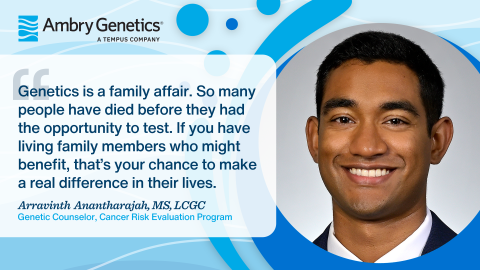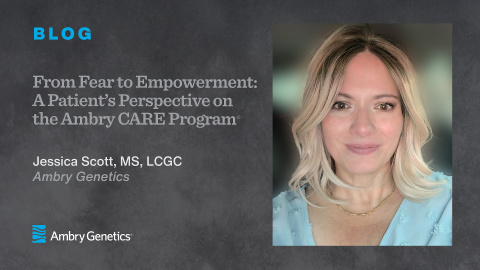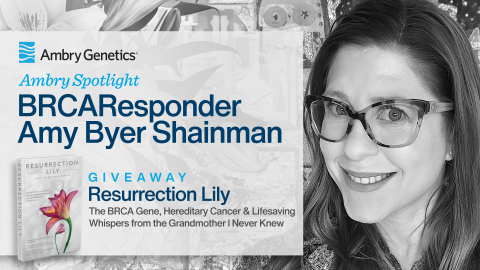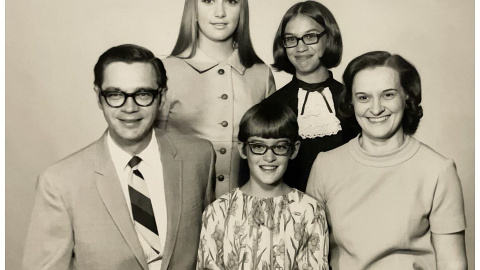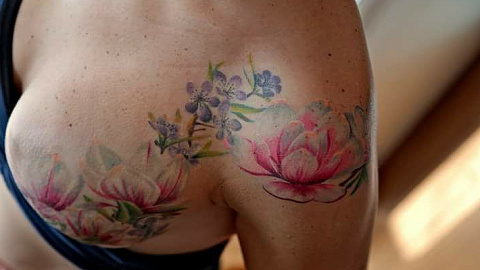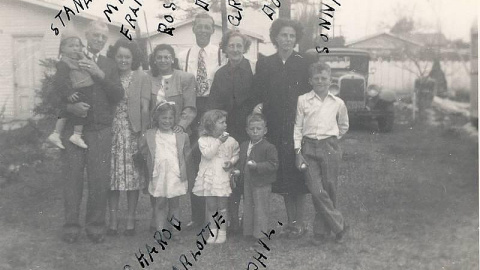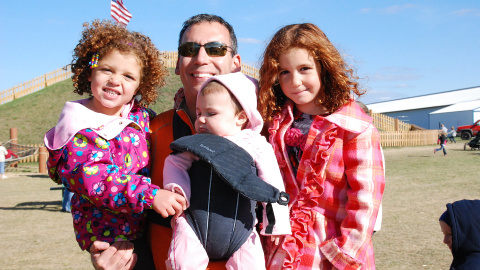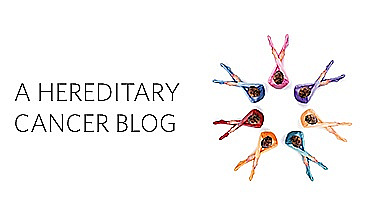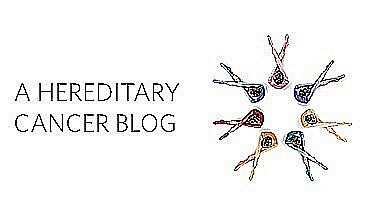- By Candela Delucchi
- Posted August 26, 2025
Making Waves: Honoring a Mother’s Final Wish Through Creative Care
Meet Arravinth (Avi) Anantharajah, MS, LCGC, a genetic counselor with the Cancer Risk Evaluation Program at the University of Pennsylvania’s Basser Center for BRCA. In our Making Waves series, we’ve spotlighted the inspiring work of healthcare providers across our industry. Learn the remarkable story of one family’s determination to complete…
- By Jessica Scott, MGC, CGC
- Posted January 15, 2025
From Fear to Empowerment: A Patient's Perspective on the Ambry CARE Program
We talk about the Ambry CARE Program® (CARE) a lot – how it helps providers identify high-risk patients, offers genetic testing and genetic counseling at scale, and gives patients insights to help them better manage their health. All of that is very powerful, but people also often ask what CARE looks like from the patient’s perspective.…
- By Meagan Farmer
- Posted September 27, 2023
Ambry Spotlight: BRCAResponder Amy Byer Shainman
Amy Byer Shainman, also known as BRCAResponder, is a patient advocate, author, and producer who provides support and education related to having a pathogenic variant in BRCA1/2 or other cancer predisposition genes. We connected with her ahead of National Previvor Day and Hereditary Breast and Ovarian Cancer Week. Amy’s sister was diagnosed…
- By Emily Huebsch
- Posted September 27, 2022
A Different Kind of Patient: Emily Huebsch Empowers Herself and Others Against Breast Cancer
Previvor: A person who has not been diagnosed with cancer, but has survived the predisposition, or higher risk, due to certain genetic mutations.* Breast cancer. Spoken in hushed tones, these scary words are often compounded by the aftermath of breast cancer deaths, creating a stigma around discussing breast cancer in regular conversations. With…
- By Jessica Profato, MS, CGC
- Posted June 8, 2018
I Survived Cancer, so Why do I Need Genetic Testing for it?
As a clinical genetic counselor, I saw many cancer survivors for genetic counseling. In some cases, it had been 30-40 years since they were diagnosed. Some of them were in their 60s-70s when I saw them, but they were young at the time of their cancer diagnosis. Years later, they were referred to me to talk about the possibility that their history…
- By Karen Malkin Lazarovitz
- Posted September 21, 2017
How I Lost My Lady Parts But Gained So Much More
My story begins more than 9 years ago, when my father called me to say was having genetic testing. His cousin had just been diagnosed with ovarian cancer and had a known BRCA mutation. Many people I’ve spoken with have no idea that they can inherit this from their father, but I did. It is vitally important to meet with a genetic counselor before…
- By Theresa Smith
- Posted November 10, 2016
These Are My Genetic Test Results… Please Don’t Shoot the Messenger
Editor’s Note: We are re-posting Theresa Smith’s entry to tie in with National Family History Day on Thanksgiving in two weeks in the U.S. Theresa was kind enough to update her piece on the importance of sharing family history and genetic test results, as challenging as it may be at times. Check back here in two weeks…
- By Cynthia Rigali Lund
- Posted September 29, 2016
In The Beginning: My Ovaries Were Talking, but I Wasn't Listening
What a perfect time to begin my story — we are in the middle of National Ovarian Cancer Awareness month, as well as National HBOC (hereditary breast and ovarian cancer) Week. I love when things line up like it was all meant to be… Things did not line up for me in October of 2012. While preparing funeral arrangements for my dad who…
- By Eve Mart
- Posted August 18, 2016
Putting Yourself First
When it comes to putting yourself first, I’d say to anyone else, ‘DO IT!’ particularly to someone who’s been through treatment for breast cancer, which is the equivalent of being put through hell and back. Truth be told, I need to practice more of what I preach. I often overextend myself on projects or requests made by others, and it’s…
- By Eve Mart
- Posted August 9, 2016
Why Social Media Is Important For People With Breast Cancer
I’ll be the first to admit, I don’t read many blogs or follow people’s cancer experiences on social media, but I do see the value in them. Networks built around cancer – whether through Facebook, Twitter, blogs or hosted communities – have a particularly active presence in healthcare social media. During the past few years, through Facebook,…
